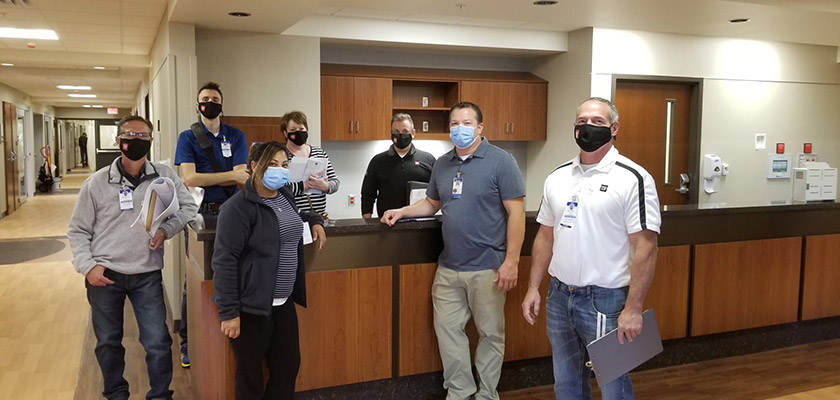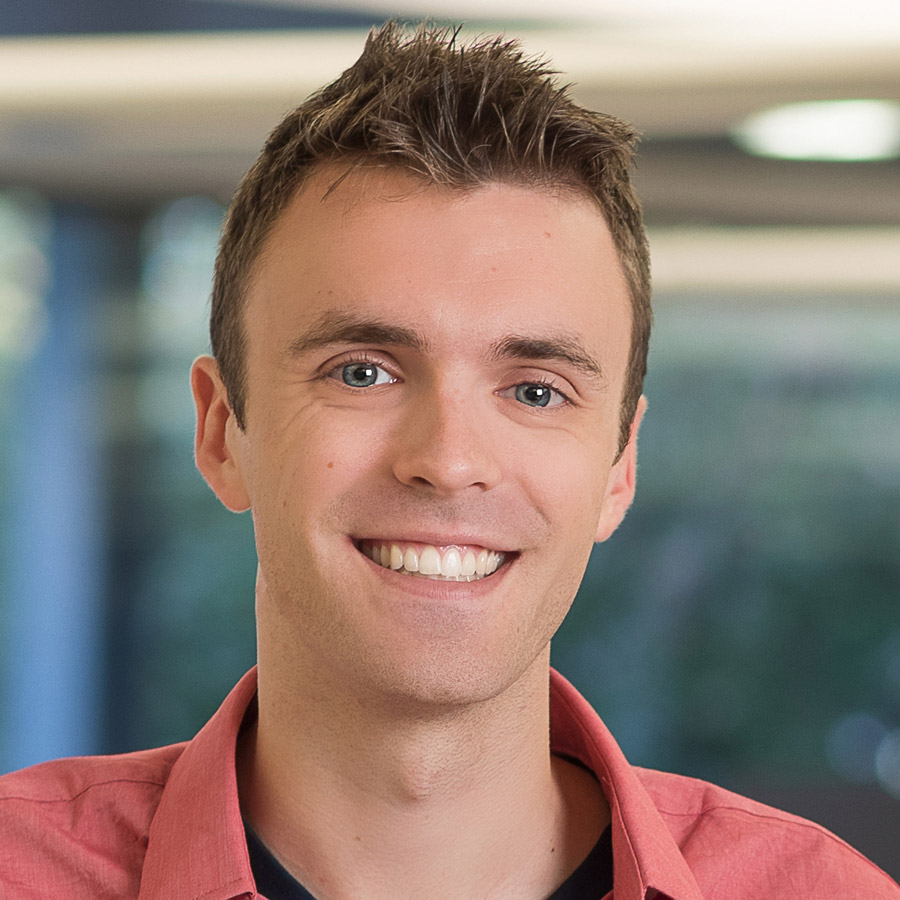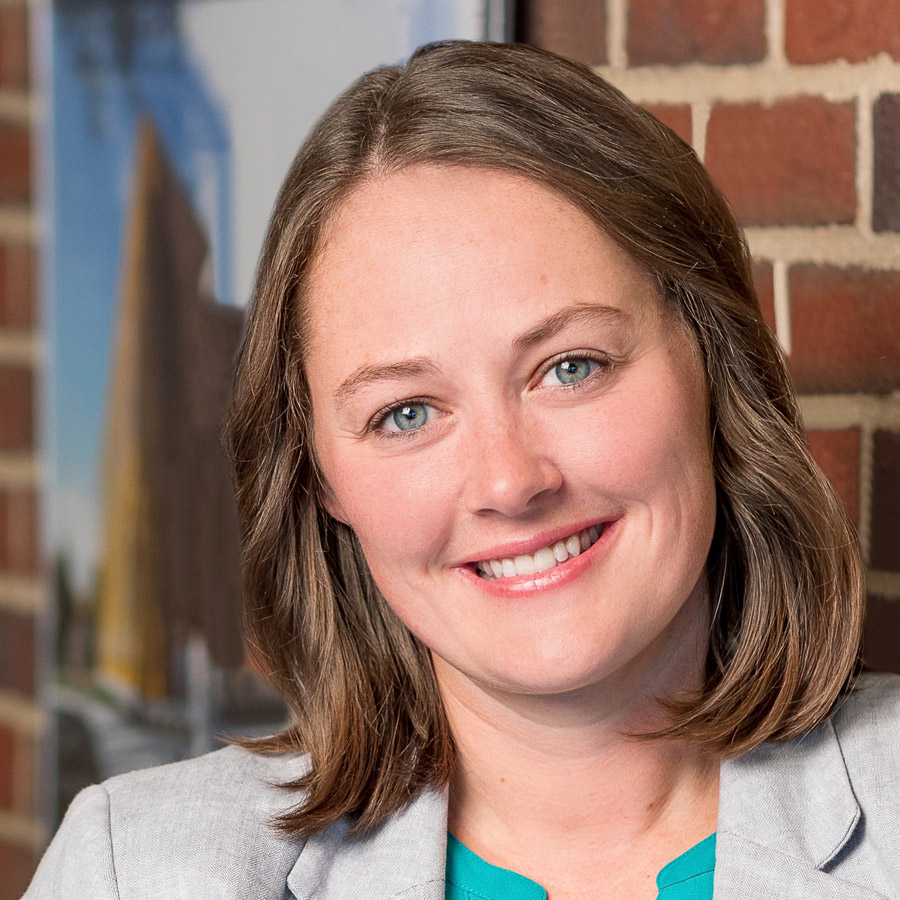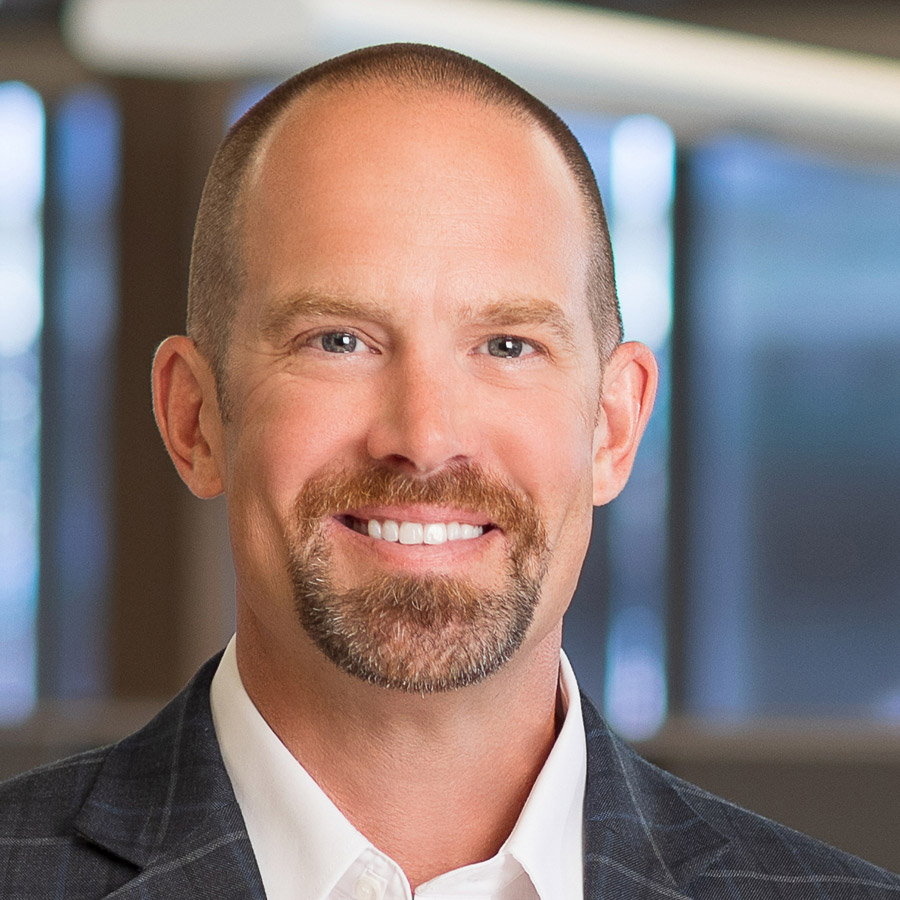Jake Buckmiller can’t picture himself working anywhere that’s just a job. He became a first-time father in the past year, and his time away from home must be well-spent. The electrical engineer looks for meaningful connections to the projects he designs for school districts, healthcare systems, government, and civic groups. He knows the passion he puts into his projects will create a better experience for those who learn, heal, or gather there.
Those people likely never will know Buckmiller was an integral part of what makes their buildings run smoothly. But he knows, and he’s found an entire team of like-minded people at TSP, Inc. who feel the same way. The multidisciplinary planning, architecture, engineering, and interior-design firm approaches each project fresh—and as a cohesive whole.
“My wife is a nurse at Sanford Health, and she recently took care of a patient in the new 2800 Level expansion I was involved in at the Heart Hospital,” Buckmiller said. “When family members use the spaces we design, that definitely makes it more personal.”
TSP team members in previous years have designed their children’s schools, their faith community’s houses of worship, and the residential healthcare facilities that allowed parents to spend the last several years of their lives in dignity. The firm’s name stands for The Spitznagel Partners—a nod to founding architect Harold Spitznagel. But those letters also have taken on a powerful context for the teamwork, service, and passion that Buckmiller and his colleagues bring to the cause each day.
Passion: Design for people
In his more than three decades with TSP, electrical designer Kerry Kloiber has contributed to hundreds of full-scale construction efforts as well as system updates and repairs. Some projects stand out for their complexity, size and scope, or the opportunities they bring to home communities. His favorite always is the one he’s working on at the moment. He focuses on the way the building will be used and imagines the individuals or user groups who will move through it each day. He tries to anticipate which devices they might use or the type of lighting they’ll need in different spaces. Then, he embeds power-supply access along with cabling and wiring to support audiovisual, data, and fire-safety systems.
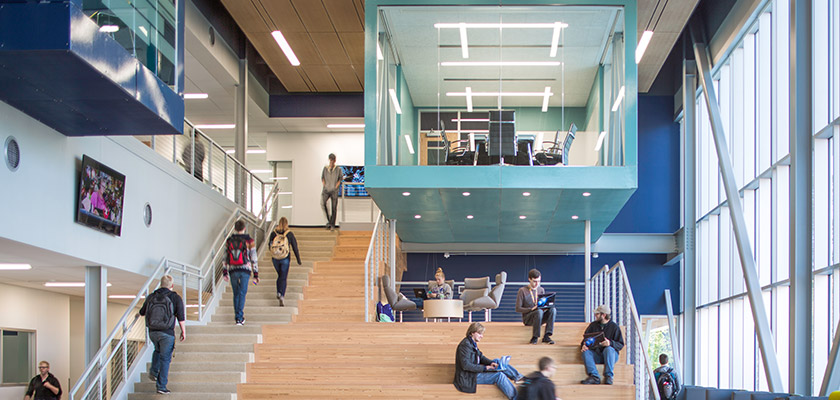
Electrical designer Kerry Kloiber’s son, Taylor, is pictured in a promotional image for the Beacom Institute of Technology at Dakota State University
Even with stakeholder-group workshops and owner feedback, it can be highly predictive work. For the Beacom Institute of Technology, though, Kloiber had a precise mental image of a Dakota State University student: his son, Taylor. The project schedule put the state-of-the-art computer- and cyber-science facility on track to be finished in time for Taylor’s senior year.
“When your kids get older, you realize that once they’re done with high school, they go off on their own. They don’t talk with you every day or every week,” said Kloiber, whose daughter also attended DSU. “This gave me another tie-in to them.”
Kloiber made each design decision knowing the outcome would affect how his son would experience classrooms and workspaces for his programming assignments. In the end, Taylor even appeared in a few promotional photos TSP scheduled for the finished building.
“We all still talk about it,” Kloiber said. “It’s one of the rare projects I’ve done that they’re really familiar with. They were part of it.”
Passion: Learning and teaching new skills
Brenda Moore spent the first seven years of her education in a two-room schoolhouse on the prairie. Today, she’s a CPA who helps teach kindergarteners about basic financial literacy through Junior Achievement of South Dakota.
Yet in the past year, Moore has expanded her own learning in ways she never could’ve predicted. As controller for TSP, Brenda is a key member of the firm’s Operations Team. Together, she and other leaders guided the company through challenges that rival the obstacles its founder faced in the 1930s. Moore played a pivotal role in TSP’s Payroll Protection Program loan process. Her dedication to figuring out complicated formulas and forms enabled the firm to keep all team members working through the pandemic.
Moore also led the company through a strategic planned change that had been years in the making. In 2020, TSP transitioned to adopt a majority employee stock ownership plan (ESOP), with the goal of attaining 100% ESOP status in the next five to 10 years. The tax-qualified retirement plan requires no out-of-pocket contribution from team members themselves. They increase the company’s share value by designing and delivering quality projects for clients, and in turn they benefit directly as employee-owners.
“I’ve been here at TSP since 2007, and this was a chance to be part of something new and exciting,” Moore said. “We’d been talking about ESOP for a long time, and the pandemic hit right as we’d committed to it. But we said, ‘Let’s do it. Let’s get engaged. We’re going forward.’ ”
Moore has found a rich network of people eager to lend their hard-earned knowledge. They know what’s working in their organizations—and just as important, believe they can help save newer ESOPs from making the same mistakes. “It’s a complex thing,” Moore said. “There are a lot of pieces and coordination with different parties. There’s a valuation of company stock and the trustee for the ESOP itself. But the ESOP community is incredibly helpful. The people I’ve met want others to succeed. They’re really interested in your ESOP journey as a company, too.”
When everyone is accountable to build the firm’s value, every person thinks like an owner. TSP team members become ESOP-eligible after their first year with the company and are fully vested after their sixth year with the firm. “It’s pretty cool to have this kind of opportunity and be part of a group while it’s going through this process,” said Moore, who’s served as TSP’s controller since 2013. “People have taken personal ownership of this idea really quickly. In the not-so-long future, everything the company does will be coming back into that ESOP and to our employees.”
Passion: Tireless commitment
Sioux Falls office leader Tim Jensen can’t not try. It’s simply how he’s built. His never-give-up philosophy, combined with a brain for problem-solving, hardwired him to become an electrical engineer. Even if getting the job done meant spending his birthday inside of a rooftop-mounted custom HVAC unit during the middle of January.
A few years ago, a TSP client experienced issues controlling humidity in a medical facility. Jensen worked with the owner, contractors, and the equipment manufacturer to troubleshoot and diagnose the faulty system components. The fix required replacing a large key part—the desiccant wheel—along with its entire drive system. Without it, the HVAC equipment couldn’t function correctly to exchange air volumes and dehumidify the air circulated indoors. Replacement required taking the unit out of service to remove existing equipment and install new components.
Jensen’s client needed to minimize downtime to make the swap, as the equipment serviced a 24-hour patient-care space. The owner cleared the calendar of scheduled procedures, but the potential remained for unscheduled emergency events. Jensen and another engineer, former TSP CEO Dick Gustaf, proposed a solution that reduced the chance for potential conflicts: They’d take advantage of the weekend.
“We picked that time because there were no appointments scheduled in the affected spaces,” Jensen said. “Dick and I volunteered our time and labor to help the manufacturer and the owner’s facilities team tear out the original wheel during overnight hours on a Friday and install the new wheel and drive system on Saturday night.”
Working both overnights and into Sunday morning gave the combined crews time to clean up, test operations, and have the repaired unit ready for use by Sunday noon. “We were all inside this custom walk-in rooftop unit, using a Sawzall tool to literally tear out the existing wheel in smaller pieces we could fit through the man-doors to the unit on the roof,” Jensen said. They brought the new wheel in by pieces for the same reason, assembling it within the small space piece-by-piece, installing a new drive system, and then running the appropriate tests to make sure it functioned properly.
“We had four or five people inside this custom enclosed HVAC unit on the roof, on-and-off, over about a 48-hour period to get it done as quickly as possible. At times, it got a little cozy with all of us in the unit, but it actually was a lot of fun,” Jensen said. “Dick and I simply assisted the installer in whatever way we could—hauling pieces in and out of the unit, offering another hand to hold things in place as they were installed, and cleaning up any debris with our shop-vacs so the unit was cleaner than when we started.”
By Sunday, after a lot of hard work and a little luck, the equipment was successfully tested and operating as designed, which meant the owner’s care teams could see patients as scheduled first thing Monday morning. When Tim returned home Sunday afternoon, his family wanted to celebrate his birthday, but he had other ideas. “I needed a nap!”
Passion: Opportunities for service
Ron Mielke has dedicated his career to building community alongside a thriving business practice. He has accomplished this as both a professional engineer and as a military officer. In January, Ron celebrated his 52nd anniversary with TSP, making him the longest-tenured team member in firm history. He joined the company when founder Spitznagel still was a regular presence in the office.
In that time, he has filled roles ranging from mechanical engineer to financial manager, project manager to human-resources generalist, and—from 1982 to 2002—CEO. Mielke embodies a simultaneous respect for tradition and a willingness to explore new methods.
“I’ve always felt that it’s important to look for ways to give back for the things the military or community has given me,” said Mielke, who retired as a brigadier general after 38 years in the U.S. Army, Army Reserve, and South Dakota Air National Guard. He didn’t come from a military family, though he always had great respect for those who serve. Mielke graduated with his engineering degree on a cold morning in January 1965 and that same afternoon received his commission as a second lieutenant in the Army Corps of Engineers. He was assigned to a combat-engineer battalion and served in an active-duty role for three years, including one year in Vietnam. He returned to earn a master’s degree in business administration while maintaining his Army Reserve status.
“One of my old college professors steered me toward the Air Guard when there was a spot coming open in the civil engineering squad,” said Mielke, who transferred his commission in 1972. “I give him a lot of credit for pointing me in a certain direction. He used the Boy Scout motto: ‘Be prepared.’ He challenged us to always work on preparing for the next opportunity, and that rubbed off in my civilian life, too. It could be a book or a seminar, or maybe it’s a course in leadership training.”
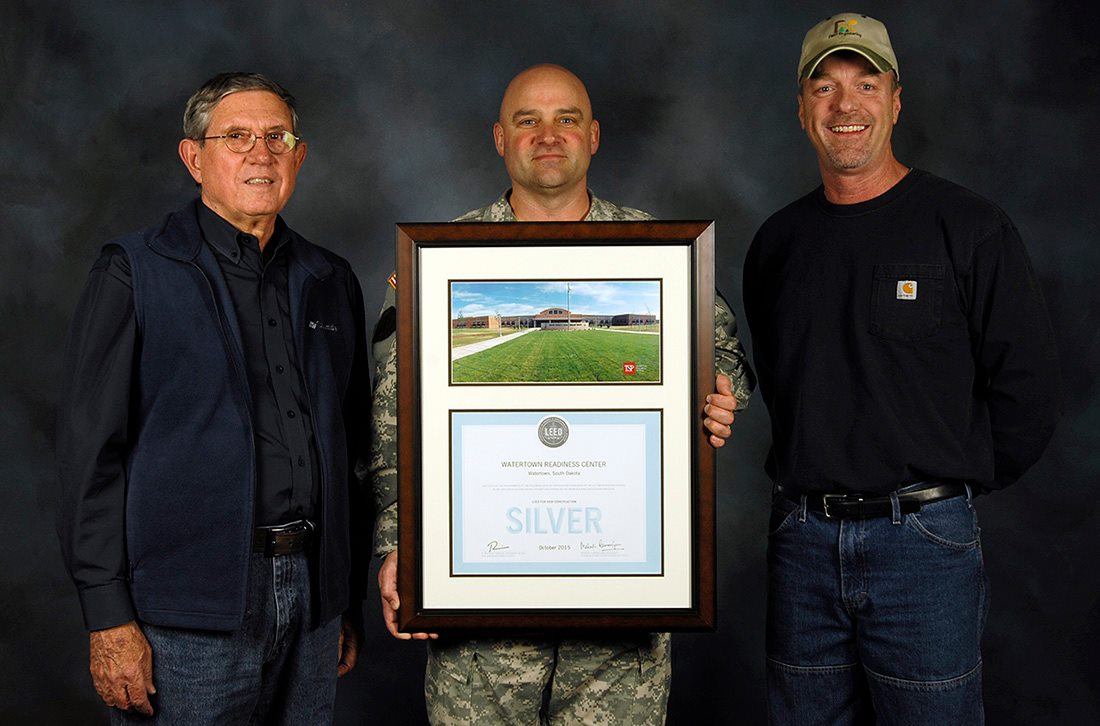 Sometimes, it was a call for help from the community. Sioux Empire United Way leadership recruited Mielke for the business-finance experience he had gained at TSP. Mielke landed first on the budget and allocation committee and ultimately served six years on the nonprofit’s board of directors. During that same span, the United Way offered office space to the fledgling Sioux Falls Area Community Foundation, which had just hired its first part-time executive director. Mielke again heeded the call, volunteering as a board member for six years with the newly formed group. “That, in turn, led to committees and fundraising and a spot on the board for the chamber of commerce,” Mielke said. “Every one of these different organizations has helped me in terms of cultivating relationships and being of service.” He’s currently co-chair of the Military Task Force for the Greater Sioux Falls Chamber and working with the local nonprofit planning the next Sioux Falls Air Show. Mielke has integrated his military and civilian careers in other ways, too. His public-sector projects include the Michael J. Fitzmaurice South Dakota State Veterans Home, Army National Guard Watertown Readiness Center, various buildings at the South Dakota Air National Guard, projects at Camp Rapid, and a planning effort for a new readiness center in Sioux Falls.
Sometimes, it was a call for help from the community. Sioux Empire United Way leadership recruited Mielke for the business-finance experience he had gained at TSP. Mielke landed first on the budget and allocation committee and ultimately served six years on the nonprofit’s board of directors. During that same span, the United Way offered office space to the fledgling Sioux Falls Area Community Foundation, which had just hired its first part-time executive director. Mielke again heeded the call, volunteering as a board member for six years with the newly formed group. “That, in turn, led to committees and fundraising and a spot on the board for the chamber of commerce,” Mielke said. “Every one of these different organizations has helped me in terms of cultivating relationships and being of service.” He’s currently co-chair of the Military Task Force for the Greater Sioux Falls Chamber and working with the local nonprofit planning the next Sioux Falls Air Show. Mielke has integrated his military and civilian careers in other ways, too. His public-sector projects include the Michael J. Fitzmaurice South Dakota State Veterans Home, Army National Guard Watertown Readiness Center, various buildings at the South Dakota Air National Guard, projects at Camp Rapid, and a planning effort for a new readiness center in Sioux Falls.
“For me, it’s come down to recognizing those opportunities and being ready for them,” Mielke said. “Each of us is our own individual enterprise. We are responsible for doing something every day to grow that enterprise. Being willing to make the commitment to serve on a board or take on a leadership role is how I’ve built my skill sets, and I’ve benefited greatly from all the groups I’ve been part of.”
